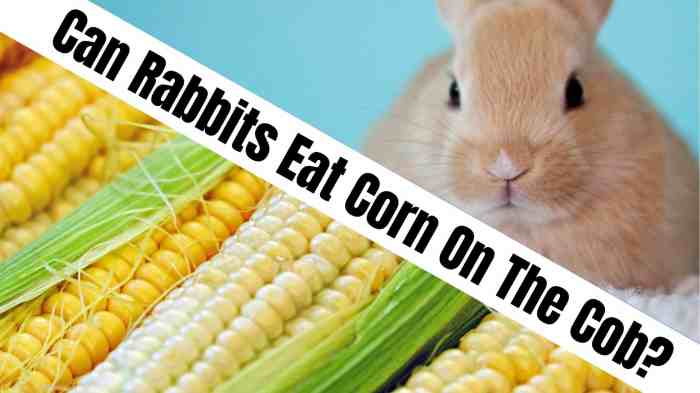Corn on the cob is a delicious and nutritious food for humans, but can rabbits eat it too? The answer is yes, but there are some things you need to know before you feed it to your rabbit.
In this article, we will discuss the nutritional value of corn on the cob for rabbits, as well as the potential risks and benefits of feeding it to them. We will also provide some tips on how to feed corn on the cob to your rabbit safely.
Nutritional Value of Corn on the Cob for Rabbits

Corn on the cob is a nutritious food source for rabbits, providing essential carbohydrates, fiber, and other nutrients.Corn is rich in carbohydrates, which provide energy for rabbits. It also contains dietary fiber, which aids in digestion and helps prevent digestive issues.
Additionally, corn contains vitamins A, C, and E, as well as minerals like potassium and magnesium.
Carbohydrates
Carbohydrates are the primary source of energy for rabbits. Corn is a good source of carbohydrates, providing rabbits with the energy they need to stay active and healthy.
Fiber
Fiber is essential for maintaining a healthy digestive system in rabbits. It helps to regulate the passage of food through the digestive tract and prevents digestive issues like constipation and diarrhea. Corn contains both soluble and insoluble fiber, which are both beneficial for rabbits.
Vitamins and Minerals
Corn is a good source of several vitamins and minerals, including vitamin A, vitamin C, vitamin E, potassium, and magnesium. These nutrients are essential for maintaining a healthy immune system, skin, and overall well-being in rabbits.
Digestive Considerations
Rabbits possess a delicate digestive system that can be easily upset by unsuitable foods. Corn on the cob, with its high starch content, can pose potential digestive challenges for these animals.Understanding the Rabbit’s Digestive System:Rabbits are herbivores with a unique digestive system.
They have a cecum, a large pouch where microbial fermentation occurs, breaking down plant fibers. However, the rabbit’s cecum is not well-adapted to handle large amounts of starch.Potential Digestive Issues:Excessive consumption of corn on the cob can lead to digestive issues in rabbits.
The starch in corn can cause gas, bloating, and even impaction. Impaction occurs when undigested material accumulates in the digestive tract, leading to severe discomfort and potential health risks.Importance of Moderation and Preparation:While corn on the cob can be a tempting treat, it should be offered in moderation and with proper preparation.
Avoid feeding large amounts or whole cobs. Instead, remove the kernels and offer them in small quantities, no more than once or twice a week. Cooking the kernels slightly can also improve their digestibility.
Safety Precautions
Corn on the cob can pose several hazards to rabbits. It is crucial to take precautions to ensure their safety when feeding them this treat.
Choking is a significant risk associated with feeding corn on the cob to rabbits. The cob’s shape and size make it easy for rabbits to get it lodged in their throats, which can lead to asphyxiation. Intestinal blockage is another potential hazard.
The tough outer husk of the cob can be difficult for rabbits to digest, and if consumed in large amounts, it can cause an obstruction in their digestive tract. Dental problems can also arise from feeding rabbits corn on the cob.
The cob’s hard surface can damage their teeth, leading to pain and discomfort.
Feeding Guidelines
To minimize these risks, it is essential to follow safe feeding practices. Feed corn on the cob only as an occasional treat, and never give it to rabbits under 12 weeks old. Cut the cob into small pieces to reduce the risk of choking.
Remove the husk completely before giving it to rabbits, and monitor them closely while they are eating to ensure they do not swallow any large pieces.
Alternative Feeding Options
While corn on the cob can be a treat, it’s important to provide rabbits with a balanced diet that includes a variety of nutritious foods. Here are some alternative feeding options that can provide similar nutritional value:
Vegetables
Fresh vegetables are an excellent source of vitamins, minerals, and fiber. Some safe and healthy vegetables for rabbits include:
- Leafy greens: romaine lettuce, spinach, kale, collard greens
- Root vegetables: carrots, parsnips, beets
- Cruciferous vegetables: broccoli, cauliflower, Brussels sprouts
- Herbs: basil, cilantro, parsley
Fruits
Fruits can provide rabbits with a source of natural sugars and antioxidants. However, they should be given sparingly as treats due to their high sugar content. Some safe fruits for rabbits include:
- Berries: blueberries, raspberries, strawberries
- Apples
- Bananas
Hay
Hay is an essential part of a rabbit’s diet and should be available at all times. It provides rabbits with essential fiber for digestive health and helps to prevent boredom. Timothy hay is the most common type of hay for rabbits, but other types, such as orchard grass hay or oat hay, can also be offered.
Closure
In conclusion, corn on the cob can be a healthy and nutritious treat for rabbits, but it is important to feed it to them in moderation. If you are unsure whether or not your rabbit can eat corn on the cob, it is always best to consult with your veterinarian.
FAQ Section
How often can I feed my rabbit corn on the cob?
You should only feed your rabbit corn on the cob once or twice a week.
Can I feed my rabbit the whole cob of corn?
No, you should only feed your rabbit the kernels of corn. The cob can be a choking hazard.
What are the signs of corn cob toxicity in rabbits?
The signs of corn cob toxicity in rabbits include: